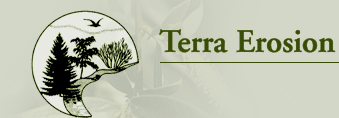Reclamation
of Contaminated Lands Adjacent to Lead-Zinc Smelter
COMINCO
DUNCAN SLOPE
PHASE
I and II
Link
to:
Phase
III and IV
Location:
Adjacent
to Lead-Zinc Smelter in Trail, BC
Client:
Teck
Cominco Metals Limited
Objective:
Reclaim
contaminated land adjacent to lead-zinc smelter by means
of capping with soil suitable for plant growth. Control
accelerated soil erosion and establishment of native
vegetation.
The
Duncan Hillside was subjected to significant sulphur
fumigation throughout the late part of the 1800ís and
the early to mid-part of the 1900ís. This created extremely
acidic soils. In addition, particulate deposition on
these slopes has resulted in high metal levels. These
conditions have resulted in loss of vegetation cover
on the slope, leading to severe soil erosion over decades
.
Terra
Erosion Control Limited, in collaboration with Morrow
Environmental Consultants, was retained to develop and
implement a site reclamation plan, including erosion
control measures and establishment of native vegetation.
In July and November 2004 re-grading of existing slope
was carried out and approximately 0.3 m of soil capping
material was placed over the Duncan Slope project area
(depth of soil capping specified by client). The area
covered was approximately 11.0 ha. and a total of approximately
25,000 m3 of material was placed.
Prior
to soil spreading by bulldozers, deformed and unhealthy
trees on the site were mulched. This work was
coordinated by Sherry Walsh RPF. After soil placement,
bulldozers tracked up and down the slope to create cleat
marks (surface roughness) for seed microsites and rain
catchments. Straw wattles were also installed across
the slope to control surface erosion.
The
site was broadcast seeded and fertilized using a native
grasses and legumes mix in conjunction with endo mycorrhizae
fungi inoculation. The seeding mix, developed by Dave
Polster R.P.Bio of Polster Environmental Services Ltd,
was specifically formulated for the site conditions.
The species were selected to provide both bunch forming
and sod forming covers, while the legumes (trefoil and
alfalfa) will provide nitrogen. A variety of native
coniferous and deciduous trees and shrubs were also
planted.
In
2005, maintenance work was required. Sediment accumulated
behind straw wattles on steeper slope gradient
sections was removed in order to maintain the
effectiveness of these wattles as sediment traps. In
2006 the entire area was manually weeded to reduce invasive
plant ingress, consisting mainly of Black Locust (Robinia
pseudoacacia). As a stand of native trees becomes
established on this site, this invasive species is expected
to become less of a problem.
The
site was monitored in the summers of 2007 and 2008;
grasses and legumes were successfully established. Planted
native shrub mortality was assessed as moderate, planted
black cottonwood and coniferous tree seedling survival
was assessed as good to this date. |

